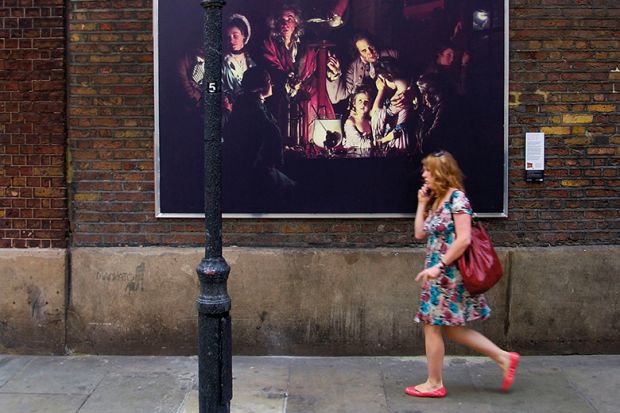Today’s world was largely created by imperialism, yet universities have often been complicit in concealing or sanitising this reality.
These are central themes of a new book by Kehinde Andrews (pictured below), the UK’s first professor of black studies, at Birmingham City University, a role he took up in 2017. The New Age of Empire: How Racism and Colonialism Still Rule the World boldly sets out to “put the final nail in the coffin of the post-racial narrative”.
The book argues that the West was founded on unprecedented genocides in the Americas and the Caribbean, yet Columbus remains a national hero in the US and “genocide” became officially accepted as a legal concept only after the Holocaust brought mass killing into the heart of Europe. The Industrial Revolution relied on profits from slave ownership – and vast sums paid in compensation to former owners of slaves – and established structures of global inequality that largely live on today. Even progressive policies to redistribute wealth within Western countries usually turn a blind eye to this wider injustice.
Many of these arguments, admitted Professor Andrews, were still “not widely accepted. The thing that should be least contentious is the impact of slavery and colonialism on British industry and development – it’s obvious. Even that is not really accepted in mainstream history.” Universities had to take a large share of the blame for failures in school curricula and public understanding of empire “because it’s the universities which are producing the knowledge. It’s just a straightforward logical point.”

The New Age of Empire also points to more specific examples of academic complicity. Some historians continue to defend “the ‘Immaculate Conception narrative’ of [the Industrial Revolution], sparked into being by divine British genius”. Other scholars played an important role in maintaining “the hierarchy of white supremacy”, whether by developing “the dreaded Washington consensus, the name given to the [often devastating] economic policies [for poor countries] supported by the IMF and the World Bank” or by training thousands of students from the underdeveloped world who are then “sent back home with all the tools to continue letting the West ransack their economies”.
Yet Professor Andrews also pointed to a more fundamental issue. Western universities were founded on – and often still invoke – the ideals of the Enlightenment. A prominent recent example was the 2018 book by Steven Pinker, Johnstone Family professor of psychology at Harvard University, Enlightenment Now: The Case for Reason, Science, Humanism, and Progress.
What this failed to acknowledge, in Professor Andrews’ view, was how the Enlightenment was the problem as much as the solution.
For thinkers such as Immanuel Kant, he claimed, “the argument has always been that you can separate out their racism from their moral theory. You really can’t!…A lot of Kant’s work is on climate and ‘moral geography’: African people obviously can’t think; white people can. He is essentially arguing that he can write the Critique of Pure Reason and we can have rights [in Europe] because of the superiority of the white race…That’s where you see the Enlightenment principles permeating universities, so you create a space for elite white men to create racist knowledge…
“It is blindingly obvious that the biggest problem for global inequality is racial: you can map poverty and race, and there’s a complete correlation. The white places are the ones with the highest GDP per capita. Africa has the lowest, and there is a hierarchy in between. This is the image of white supremacy from the Enlightenment.”
Putting our faith in Enlightenment ideals, therefore, “normalises that level of inequality and says it’s perfectly OK for Africans to live at levels of poverty we will never experience in the West”. Even where they otherwise sound appealing, “it is impossible for them to deal with racism on a structural level”.
In terms of where we go from here, Professor Andrews pointed to his earlier book, Back to Black: Retelling Black Radicalism for the 21st Century, which “lays out what black revolution looks like”. But he also saw it as crucial to bring into the academy perspectives that have largely been excluded.
Black studies, he explained, has “its intellectual framework in activism and presents a very real criticism from below…There hasn’t been that much black academic production in universities because we haven’t been in universities…But there’s a strong tradition of black studies which isn’t in the university, so there are places we can go to get information and knowledge from…If you are white, your chance of being exposed to any of these debates is much more remote.”
It was greatly to be regretted, therefore, that the UK’s very “segmented” system of higher education meant that those studying criminology or even dentistry do not get an opportunity, as they might in the US, to do a module in black studies as well.
POSTSCRIPT:
Postscript: Enlightenment ideals mask academy’s dark foundation
Register to continue
Why register?
- Registration is free and only takes a moment
- Once registered, you can read 3 articles a month
- Sign up for our newsletter
Subscribe
Or subscribe for unlimited access to:
- Unlimited access to news, views, insights & reviews
- Digital editions
- Digital access to THE’s university and college rankings analysis
Already registered or a current subscriber? Login








